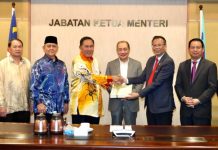In the past months and weeks, Malaysia has experienced unprecedented twin challenges of constitutional turmoil and a once in a century epidemic. As the dust begins to settle on yet another political upheaval, the time has come to pause and ruminate.
Regardless of whether a coalition is regarded as “one party” or merely “a coalition”, the fact remains that in Malaysia, no single party has been able to command the majority of the members of the Dewan Rakyat.
The first government of independent Malaya which took power on 31 August 1957 was the Alliance coalition comprising UMNO, MCA and MIC. Every single Prime Minister of Malaysia headed coalitions, and that trend will continue in the foreseeable future, especially more so given the outcome of the 14th General Elections.
Malaysia has in the past exemplified partisanship, where a political party adheres only to its interests without compromise, characterised by a lack of cooperation between rival political
parties. This often gives rise to the danger of a group pushing its interests to the detriment of the national interest.
Alternatively, non-partisanship, is a political situation, usually in the context of a two-party
system (especially those of the United Kingdom, United States and Australia), in which
opposing political parties find common ground through compromise. It is any political act in
which both of the two major political parties agree about all or many parts of a political choice.
Non-partisanship involves trying to find common ground, including making compromises to reconcile the desires of both parties from an original version of legislation or other proposal. Failure to attain nonpartisan support can easily lead to gridlock, often angering each other and their constituencies.
Some sixty years after the founding of Malaysia and as Malaysia enters into the last third of
her first century, the time has come for this nation of ours to put politics aside and consider
where we, as a nation, want to head to in the future as a democratic jurisdiction.
On 4 April 2019, a bill proposing an amendment to the Federal Constitution was tabled in the Dewan Rakyat to amend Article 1(2) to restore the status of the two East Malaysian
states of Sabah and Sarawak according to the original content of Malaysia Agreement that
was signed in 1963.
Despite six hours of debate in the Parliament during the second reading of the bill on 9 April 2019, only 138 MPs supported the bill, 10 votes short of the two-thirds majority of the
chamber, 148 votes, required for amendments to the Constitution.
Yet, a glimmer of hope emerged when non-partisan politics was demonstrated when on 16 July 2019, a bill to reduce the minimum voting age in Malaysia from 21 to 18 years old was passed with a unanimous 211 votes from the Dewan Rakyat and shortly later on 25 July 2019, it was passed with another unanimous 47 votes from the Dewan Negara.
There can be little doubt that fundamental structural changes to our democracy need to be actually implemented, and not merely dangled out as incentives, to future-proof Malaysia’s democratic institutions such as:
1. Amending the Federal Constitution to implement an anti-party-hopping law.
2. Separation of powers between the Public Prosecutor's Office and the Attorney General’s Chambers.
3. Implementing the lowering of the voting age to 18 initiative.
But much more than these, scant recognition of the aspirations of Sabah and Sarawak cannot be paid and should and must also be made part and parcel in these essential raft of
reforms including:
1. Restoring Sabah’s rights over utilities and gas.
2. Restoring the Tuan Yang Terutama’s powers to appoint Judicial Commissioners for Sabah and Sarawak.
3. Restoring Sabah and Sarawak’s boundaries by repealing the Territorial Seas Act 2012.
4. Restoring the status of the two East Malaysian states of Sabah and Sarawak according to
the original content of Malaysia Agreement 1963.
For any real structural reforms to be made a two-thirds super majority is required, meaning
that the relevant Constitutional amendment bills must be passed in each House of Parliament (Article 159(3)). Thus, for the Dewan Rakyat, the minimum number of votes required is 148, being two-thirds of its 222 members.
Against the backdrop of a fractious Dewan Rakyat, Malaysia inexorably moving towards a
two-party system, where a two-thirds majority of the Dewan Rakyat is needed for any
structural reforms and the Yang di-Pertuan Agong repeatedly reminding all parties to make
paramount the interest and welfare of the people of Malaysia, the time has come for all
Malaysians to work together. It is therefore fervently hoped that whoever becomes the next
Prime Minister, this person will be able to garner enough support for the much needed
structural changes.
Sabah, has to a large extent, moved onto the next level of maturity. Notwithstanding the thin margin separating government and opposition, politicians across both divides have shown remarkable responsibility in putting the people first. The state government on its own initiative and without prompting gave a special RM100,000 allocation to each of the 31 Opposition assemblymen in Sabah to help them in the fight against the covid-19 pandemic and provide assistance to the people in need during these times.
It is precisely this equilibrium which is sorely needed to be replicated at the Federal level for Malaysia to move forward.
Finally, the Sabah Law Society (SLS) would like to make it clear that it does not support any political party. SLS has always acted independently and when needed, SLS will stand up, speak up and will continue to do so on matters pertaining to law and public interest,
uninfluenced, and without fear or favour.-
Roger Chin
President
Sabah Law Society






